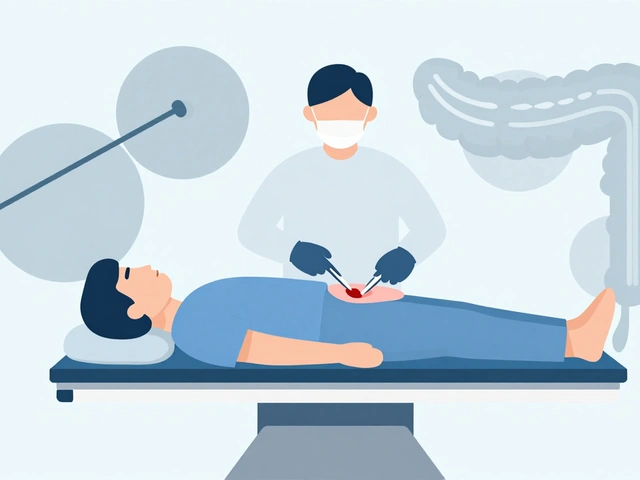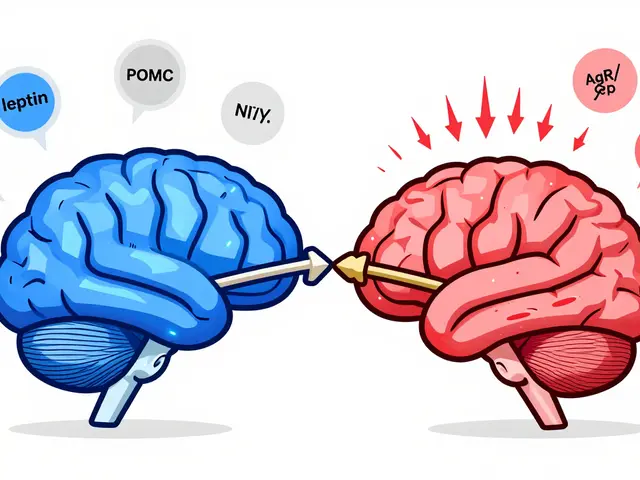Simvastatin is everywhere—blister packs tucked in medicine cabinets across Northern Ireland and far beyond. Most people grab it for their cholesterol, not realizing it might have a finger in the thyroid pie. But here’s the thing: statins, including simvastatin, don’t just target blood fats. They can sometimes cross paths with the delicate system controlling our metabolism, mood, and even our energy levels. If you’ve ever wondered why you feel unusually sluggish, or why your bloodwork looks off while you’re popping simvastatin, you’re not alone. People’s reactions range from mild curiosity to hushed panic, especially when GP check-ups turn up ‘borderline’ thyroid readings. Science, as it turns out, is just beginning to connect these dots. The question remains: does your statin really mess with your thyroid, or is it just a coincidence? There's a surprising story hiding inside those tiny white tablets, and I’ll walk you through what you actually need to know.
How Simvastatin Works and Where the Thyroid Fits In
Let’s start from the ground up. Simvastatin is a statin—the sort of pill your doctor might send you home with after cholesterol creeps above healthy limits. It works by blocking a substance in your liver needed to make cholesterol. Lower cholesterol means a lower risk of strokes and heart attacks, plain and simple. But the world inside your body is never that straightforward. Hormones, enzymes, and proteins constantly overlap, bickering or working together. One of those vital hormonal systems is your thyroid.
The thyroid sits at the base of your neck, and its job is to manage the speed of almost every process in your body—from your heartbeat to your digestion, to how fast you burn calories. It’s not acting on its own, though. Your pituitary gland, which lives up in your brain, keeps tabs on things by releasing something called TSH (thyroid-stimulating hormone). When thyroid hormone levels drop, TSH rises to kick your thyroid back into gear. Now, this is where simvastatin can nudge things askew. Research from different parts of Europe, including a well-noted study in 2023, found that simvastatin can sometimes lower levels of T4 and T3 (those are major thyroid hormones) or elevate TSH—often ever so slightly, but enough to raise eyebrows among doctors.
It gets more tangled when you factor in age, weight, and even local rates of iodine in the diet—for example, folks in parts of rural Ireland can have low iodine, which already puts their thyroid at risk. If you’re older, female, or have a family history of thyroid problems, the effect can be a bit stronger. And while not everyone on simvastatin notices thyroid changes, someone with a borderline thyroid or “subclinical hypothyroidism” might tip right over into needing thyroid medication. So, is this a reason to steer clear of simvastatin? For almost everyone, the heart benefits trump the tiny thyroid shift. But it’s something to clock, especially if you feel off after starting the drug or notice unexplained weight changes.
Let’s get specific on how this plays out in real life. A 58-year-old Belfast man went to his GP after feeling shattered for weeks. His cholesterol was down, but his TSH levels had crept up—enough for his doctor to pause and say, 'Let’s check your thyroid again in a few months.' That story isn’t rare, and most of the time, symptoms like tiredness, hair changes, or brain fog do resolve once the body finds a new balance. Still, if medication tweaks or dose reductions don’t solve things, your GP might suggest a short trial off statins or a switch to a different medication just to see if you bounce back. Never stop any statin without talking to your doctor—abrupt stops can be risky for your heart.
Doctors now keep a closer eye on thyroid levels in anyone starting a statin, especially those at risk for thyroid disorders. Look for bloodwork that measures TSH and free T4—these are the two numbers your GP wants to see. And if you’re keen to watch for subtle changes, jot down any symptoms like freezing hands, sudden weight gain, or unexplained muscle cramps. These little clues help your doctor spot patterns that otherwise get missed in a busy GP surgery.

Side Effects, Symptoms, and the Realities of Dual Treatment
Most people hear ‘side effects’ and picture the classics: muscle aches, mild headaches, maybe the odd bout of indigestion. But when it comes to simvastatin, thyroid issues are more of a ‘background’ concern—you won’t see them plastered across the leaflet unless you dig into the medical details. Even so, plenty of people who’ve been on simvastatin for a while report feeling quite different than when they started. It’s rarely dramatic. Think low-level fatigue that makes getting out of bed in the dark Belfast winter mornings feel extra cruel. Or weird shifts in appetite and unexplained dry skin. If your thyroid tips ever so slightly underactive, these are the clues you’ll bump into first.
Let’s get a bit more technical for a moment. Statins can sometimes jostle the enzymes and proteins that handle cholesterol. Some of these same enzymes are tangled up with thyroid hormone production or how your body absorbs and processes those hormones. For people living with pre-existing thyroid disease, or those on medications like levothyroxine, statins can change how well those drugs work. There’s also evidence—like data published in the Journal of Endocrinological Investigation in 2024—that statins can mask or muddy the results of some thyroid blood tests. This means lab numbers might not fully reflect what’s going on in the body, especially right after big medication changes.
That raises questions, especially if you’re juggling both cholesterol and thyroid medication. Doctors often suggest spacing the timing of meds—taking your thyroid pill first thing in the morning, and simvastatin with your evening tea or supper. This strategy helps keep absorption clean and avoids one drug getting in the way of the other. If you’re someone who loves a lie-in or just forgets to take tablets at the right time, setting a recurring reminder on your phone makes a difference. Old-school pill cases with labeled days help too.
Now here’s an interesting ripple: some studies suggest that lowering cholesterol with statins like simvastatin could indirectly help the thyroid, especially in people with autoimmune issues. Excess cholesterol can sometimes ‘clog up’ the fine workings of hormone-producing cells, and by shifting cholesterol down, those cells run smoother. But, and this matters, the data is still early and scientists aren’t shouting about it just yet. It’s a little like finding whisky might protect you from colds—tempting, but take it with a grain of salt for now!
You might be wondering, 'How will I know if simvastatin is messing up my thyroid?' Here’s what to watch for:
- Tiredness that won’t quit, even after good sleep
- Strange weight changes, without changing your diet
- Dry or thinning hair
- Sensitivity to cold weather (even by Belfast standards)
- General ‘brain fog’ or trouble concentrating
If any of these sound familiar and you’re on simvastatin, bring it up with your nurse or GP. Sometimes a slight tweak, or even just tracking your numbers a bit more closely, can iron things out. And don’t discount your own instincts—no one knows your daily routine, energy, or moods quite like you do.
Also, don’t forget that diet, stress, and other conditions play into thyroid health. Many people blame the statin, but might actually be dealing with undiagnosed sleep apnea, vitamin D deficiency, or just plain run-down from modern life. If you’re feeling rubbish, a full check-up (including thyroid bloodwork, iron, and vitamin levels) is the smarter move than blaming a single pill. It’s rarely just one thing, after all.

Tips, Facts, and How to Protect Your Thyroid While Using Simvastatin
So, you’re on simvastatin and worried about your thyroid function? There are practical steps you can take without getting bogged down by medical jargon or panic.
First, stick with regular blood tests—ideally every 6 to 12 months, more often if you start feeling unwell or make changes to your dose. Testing TSH and free T4 every so often gives you and your doctor a proper record. If you notice your numbers creeping out of the normal range, or creeping higher than ‘your usual,’ flag it early. Doctors in the UK have become more open in recent years to checking thyroids in anyone starting long-term statins, especially if symptoms pop up.
Next, be wary of online forums brimming with horror stories. While there are some genuine cases of people feeling off, the vast majority handle simvastatin just fine. Remember, the risk of life-changing heart attacks or strokes from untreated cholesterol is real and way higher than the risk of minor thyroid wobbles. Still, keeping track of how you feel—and keeping a running list of symptoms in the notes on your phone—will help spot early problems long before they affect your daily life.
If you’re already on thyroid meds like levothyroxine, talk to your GP or pharmacist about timing. Splitting statin and thyroid meds by several hours can help them both soak into your system without tripping over each other. Try not to take either with a big milky breakfast, as dairy can mug both pills and block absorption.
Diet plays a supporting role in thyroid stability. If you eat plenty of fish, dairy, and even just the odd pinch of iodised salt, you’re likely getting enough iodine. But if your diet is heavy on processed or non-iodised foods (think takeaways or chips several times a week), your thyroid might suffer more from the lack of nutrients than from simvastatin itself. Throw in a few Brazil nuts here and there—they’re high in selenium, vital for thyroid defense.
- Get plenty of sleep. Poor rest puts your whole hormonal system under strain.
- Keep moving daily, even if it’s just a short stroll around the block. Exercise helps every endocrine (hormonal) system work better.
- Cut back on stress, or find practical ways to let off steam. Chronic stress pushes your adrenal system hard, which bumps into your thyroid sooner than you think.
- If you smoke, quitting immediately helps your thyroid recover and supports statin benefits.
- Avoid huge swings in weight, as yo-yo weight changes stress your thyroid’s ability to keep up.
And if family members are on cholesterol or thyroid meds, talk about your experiences. Sometimes patterns run in families, and a few open conversations can save both of you endless hassle with new symptoms or poorly understood blood test results.
Lastly, don’t be shy about asking your doctor for printouts of your blood results. Sometimes what counts as ‘normal’ on a chart isn’t your normal, so having a record helps spot subtle dips or jumps before symptoms set in. If you’re ever confused, bring your questions—and your printouts—with you. GPs are much more helpful when you arrive with solid info and specific pointers, rather than vague ‘I just feel rubbish’ complaints.
The bottom line? Keep simvastatin’s heart-saving perks in view, but trust your own observations and don’t be afraid to push for answers if you’re concerned about your thyroid. Medicine is a partnership—not a guessing game. Stay curious, stay on top of your own health, and don’t let the little details sneak past you. Statins like simvastatin are still the gold standard for cholesterol, but now you’re armed with the facts to look after your thyroid just as well. No need for panic, just a bit of smart self-care along with those daily tablets.







Steve Helsel
July 18, 2025 AT 16:15Honestly, I didn't expect simvastatin to mess with thyroid hormones much, but this article made me pause a bit. I usually just focus on the cholesterol part and don't really think much about the thyroid, but it looks like there might be some interaction.
It's a bit scary how many side effects people might overlook, right? I mean, if you're taking this statin, monitoring your thyroid might actually be necessary. It’s something doctors often skip or assume won't be an issue.
The tips mentioned about managing your thyroid health while on simvastatin seem practical, but I wonder if most people get that info from their healthcare provider.
Have any of you experienced thyroid problems while on cholesterol meds? I’m curious if this is a common thing or just rare cases that pop up in studies.
Still, I appreciate that the article sheds light on this. We should probably chat about more drugs and their broader impacts rather than just focusing on one problem.
Steve Moody
July 20, 2025 AT 07:27Let's clarify some points, shall we? First, the title contains a colon and commas, which are correctly used but frequently misunderstood by many. Nuance in punctuation actually aids the clarity of such health-related topics.
Regarding simvastatin's effect on the thyroid, the literature does suggest some altered thyroid hormone levels in a few patients, but the evidence is mixed. It's critical we don’t jump to conclusions without thorough peer-reviewed backing.
Statistically speaking, the incidence rates are low, but still significant enough to consider when prescribing.
I also find it imperative to underline that patient monitoring and individualized therapy must be emphasized. Overgeneralization neither helps the clinician nor the patient.
Additionally, the article should have included references to studies or medical guidelines for those inclined to deep-dive into this intersection of statins and endocrine function.
Adrian Hernandez
July 20, 2025 AT 18:25Can we trust big pharma when it comes to prescribing statins? Honestly, I don’t think they tell us the whole story about simvastatin’s effects on the thyroid. There are whispers that pharmaceutical companies downplay these interconnected health risks.
The way the article vaguely mentions side effects feels like typical corporate spin — just enough info to keep us compliant but not enough to make us question.
Moreover, I’ve been reading how statins could mess with thyroid function seriously, causing symptoms that doctors often dismiss as unrelated.
I’d love to see more independent research instead of industry-funded studies that just rubber-stamp safety.
Anyone else suspicious about how little is openly shared about these medications’ full scope of impact?
At the minimum, patients should demand comprehensive thyroid screening if they’re on simvastatin long-term.
duncan hines
July 21, 2025 AT 14:52Seriously, who writes these articles? It’s a load of half-baked info with no concrete answers. Simvastatin and thyroid health? More like a guessing game presented as fact.
This whole thing reeks of fear-mongering mixed with pseudo-science. If you want to manage your cholesterol, just do it and move on. Jumping at every shadow about side effects gets old fast.
Do you really think the thyroid acts up suddenly because of a statin? Sure, knock yourself out with all the monitoring, but at some point, it’s just hypochondria on steroids.
Also, the tips on managing thyroid health while on statins are vague and don’t offer anything new or useful.
Come on, people, if you don’t wanna be a guinea pig, just eat right, exercise, and stop obsessing over every little symptom. The drama around these drugs is exhausting.
Chip Hutchison
July 21, 2025 AT 22:32I appreciate the detailed effort here to link simvastatin use with thyroid health. The thyroid’s role in regulating metabolic processes can definitely complicate how we respond to cholesterol medication.
In my experience, it’s important that patients and doctors maintain open communication about any new symptoms, especially those related to energy levels, weight changes, or mood swings, since these can hint at thyroid dysfunction.
The article's suggestions for timely blood tests and lifestyle adjustments are practical, especially for those juggling multiple health issues.
We need to consider socio-economic factors, too. Some patients don’t have easy access to frequent testing, which might delay identification of thyroid-related problems.
Sharing knowledge like this broadly helps raise awareness and fosters more equitable health outcomes.
Have those here had experiences with monitoring thyroid hormones during statin therapy? What challenges did you face?
Carlise Pretorius
July 22, 2025 AT 17:39Interesting read. I didn't know there was any connection between simvastatin and the thyroid at all. In South Africa, most patients are more worried about the cholesterol number itself than potential hormone effects.
The casual tips about managing both are helpful and non-intimidating, which is good for people like me who are new to this stuff.
One thing I'd add is that sometimes access to regular thyroid testing can be a challenge depending on where you live.
Also, I like the gentle reminder that watching out for side effects is a shared responsibility between doctors and patients.
Overall, this post encourages dialogue which we badly need in the realm of chronic disease management.
Narayan Iyer
July 23, 2025 AT 05:09The biochemical cross-talk between the HMG-CoA reductase inhibition by simvastatin and thyroid hormone regulation is complex but fascinating.
Cholesterol metabolism and thyroid hormone synthesis share interconnected pathways, so it’s noteworthy that statin therapy might indirectly influence thyroid function tests.
Recent publications have alluded to subtle variations in T3 and T4 in patients undergoing long-term statin treatment.
As an inclusive mentor advocating for patient-centered approaches, I think it’s vital to integrate endocrinological assessments into hyperlipidemia management protocols.
Moreover, educating patients about potential symptoms—beyond the biochemical panels—can improve adherence and outcomes.
Has anyone tested different statins to see if effects on thyroid hormones vary by medication type or dosage? That data would be illuminating.
Jessica Hakizimana
July 24, 2025 AT 13:05Hey everyone, thanks for such an insightful discussion already. I just wanted to add a more optimistic perspective.
Taking medication like simvastatin does require some extra mindfulness about our bodies. It’s easy to feel overwhelmed, but seeing it as a step toward balance is empowering.
Managing thyroid health alongside cholesterol is doable with proper support and information.
The tips shared in the article about monitoring and lifestyle tweaks are really encouraging to me. They highlight that we do have some control here.
Don't get discouraged by scary side effect lists; instead, use them as a checklist for self-care.
We’re all on this health journey together, and sharing stories helps everyone feel less alone.
Achint Patel
July 26, 2025 AT 00:39Interesting read, although I suspect the connections might go deeper than what’s presented.
From a philosophical standpoint, the body’s biochemistry is so interconnected that isolating the impact of a single drug, like simvastatin, on something like thyroid function might ignore systemic influences.
The medication might trigger adaptive responses elsewhere that don’t show up in straightforward lab values but still affect wellbeing.
I’d love to see more holistic studies examining these effects over long durations and across diverse populations.
In practical terms, it reinforces the importance of treating not just symptoms or biomarkers but the patient as a whole.
Danielle Watson
August 5, 2025 AT 23:42Just popping in to say that the information about the interplay between simvastatin and thyroid health is something many overlook, so this article is a reminder to stay vigilant.
It's good we’re discussing here because sometimes patients don't feel comfortable bringing up their thyroid concerns when they're primarily focused on cholesterol management.
We should remember that medication regimens aren't one-size-fits-all, and subtle changes in how they affect different body systems make a big difference.
Also, a gentle suggestion to follow up regularly with your doc if you notice any changes and not just assume it’s the medication or nothing.
Being proactive can prevent a lot of downstream problems.
Sheila Hood
August 17, 2025 AT 16:15It’s refreshing to see some level-headed discussion here.
Yes, simvastatin has documented influences on liver enzymes and muscle health but the thyroid connection is still not entirely nailed down.
Patients worried about secondary effects should feel empowered to discuss comprehensive lab work with their healthcare providers, but also understand that correlation is not causation.
Many symptoms attributed to statins are often multifactorial and can easily be misinterpreted.
This article lays a good foundation, but I’d caution readers from jumping to fear-based conclusions.